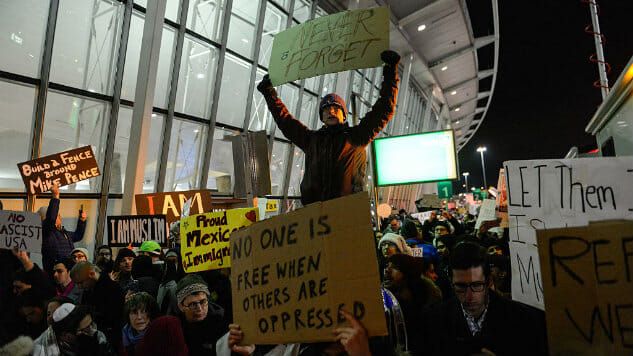
My husband was sick and our three kids— ages 7, 3, and 2, though regulars at Black Lives Matter and other marches— weren’t dressed for a protest in 29-degree weather. What could I do to support the #NoMuslimBan protesters at JFK on Saturday night?
Pizza.
I strapped the kids into their car seats and headed to the airport, Googling “pizzerias near JFK” at red lights along the way. “Sorry,” the guy who answered the phone at Dee & L’s Pizza Plus on Rockaway replied, “we just got a call from Miami for 35 pies to be delivered to the airport, so I can’t take any more orders right now. Our ovens are full!” I dialed Domino’s, also on Rockaway, and ordered a dozen cheese pies. When I double-parked and ran in to pick them up, employees told me they’d been busy all night and yes, lots of orders were headed to the airport.
The anonymous Miami Good Samaritan and I weren’t the only ones feeding the resistance at JFK. Friends drove down from Westport, Connecticut with water, granola bars, and cookies, arriving after NYPD, state troopers, and Port Authority police had essentially closed down the roadway into JFK’s Terminal 4, where protesters were standing their ground against the Muslim travel ban. My friends jumped a fence to deliver their snacks, which were welcome not only because of the frigid 29-degree weather, but also because many of the protesters had been there for hours, standing outside T4 since the action had been scrambled ad hoc via social media earlier that morning. Not allowed to enter the terminal if they weren’t ticketed passengers—which, of course, they weren’t—they didn’t have access to any of the overpriced burgers at Shake Shack or even a coffee from Peet’s.
Do-gooders weren’t just delivering pizzas in New York; they were also sending pies to Dulles in D.C., where the pizza boxes were turned into protest signs once the slices had been eaten. By Sunday, as rallies and marches continued at airports around the country, they were expanding their repertoire. “We pull[ed] into the arrivals level of SFO’s international terminal around 1:15 PM,” wrote protester Christine Wei on Facebook. “A spread of water, coffee, sandwiches, and fruit [was] set up curbside right outside an entrance.” Later in the day, she said, she even saw vegan wraps. The food, which was free, didn’t seem to be supplied by just one group or individual. To Wei, the effort spoke “to a spirit of generosity and welcoming. It creates the type of community that protesters are fighting for – one in which everyone sees each other and leans on each other.”
The roles of buying, prepping, and delivering food for protests suit people for different reasons, some because they’re undocumented or have an immigration status that could be put in jeopardy by protesting, some because of their current time and circumstances, and others, like Maryam Dilakian, because feeding people is one of the things they do best. Dilakian, who was distributing homemade brownies and chocolate chip cookies at a rally of New York City public school kids protesting the confirmation of Betsy DeVos as Secretary of Education, is an English teacher, activist, Armenian immigrant, mother, and a baker. She marches and she writes and she bakes, and she feeds. In a bitter moment, sweetness is most welcome. Wei, the San Francisco protester, says the folks feeding the resistance play an important role. “Sustainability is key for a movement to stay strong and effective,” she says, “and being fed and hydrated is a part of that. It says, ‘We’re in it for the long-haul.’”
The resistance through food is happening in other ways, too, like the Syrian Supper Club, which started long before Trump took office but has deeper resonance now, bringing people together over food in ways that will be increasingly important. And then there’s Omnivore Bookstore’s front and centering of cookbooks from the seven countries affected by the Muslim ban. “People from these countries are now banned from entering the U.S. Learn about them,” read a hand-lettered sign in the Bay Area shop’s window, with arrows pointing to featured titles: The Aleppo Cookbook, The Iraqi Family Cookbook, Tastes of Africa, Persiana, and Aromas of Aleppo. A photo of the display, posted by the bookstore on twitter, has been retweeted over 1,000 times and liked more than 2,000; it also inspired an article that summarized these and other cookbooks from the countries targeted by Trump’s Muslim ban and other isolationist policies.

Photo courtesy of Omnivore Books
But what about the long-haul of which Wei speaks? As we wake up to a new barrage of unprecedented, outrageous announcements each day, it becomes increasingly clear that we are indeed in this for the long-haul. The resistance will need to be sustained, it will need to be in the streets, and it will need to be fed. I think about this as I look around my apartment and realize how our current moment is reinforcing for me what’s important and what’s not. Today’s #ResistTrumpTuesday action? Important. The dust on the bookshelf and the clothes in the laundry basket? Not important. The dishes in the sink? Important only because my husband, who came to the U.S. as a refugee, is finishing the soup I started making. And that’s important because we’re part of the resistance. And the resistance has to be fed.
Julie Schwietert Collazo is a bilingual writer and journalist based in NYC.